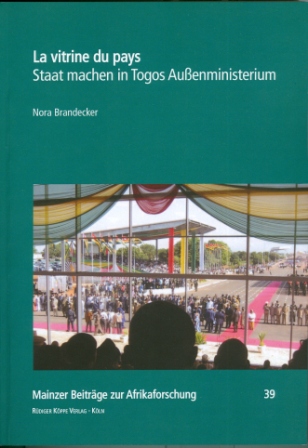
La vitrine du pays
Staat machen in Togos Außenministerium – Mit einem Vorwort von Thomas Bierschenk
Author: Nora Brandecker. With a preface by: Thomas Bierschenk. Series edited by: Thomas Bierschenk, Heike Drotbohm, Raimund Kastenholz, Matthias Krings, Carola Lentz, Anja Oed.
Series: MBA Mainzer Beiträge zur Afrikaforschung Volume 39
2017283 pp.
Appendix: 1 organigram, 1 chart, 5 tables, 1 chart
Text language(s): German
Format: 170 x 240 mm
680 g
Paperback
€ 49.80
Buy 'La vitrine du pays' as a downloadable PDF document directly from our online shop »
Order 'La vitrine du pays' as print edition »
The Togolese Ministry of Foreign Affairs (MAEC) should be considered as the vitrine du pays, the “display window of the country”, and it is of utmost importance in providing representatives of foreign governments and international organizations as well as potential investors with a positive first impression of Togo, as official sources proclaim. The high staffing level of the ministry seems to bear out these statements, but a closer look reveals fine cracks in the storefront of the vitrine du pays. Most of the employees of this ministry do not “do” foreign policy, but frequently nothing at all – at least at first glance –, and the chronic shortage of office supplies even hampers fulfilment of the few arising tasks.
Aside from the great number of staff that is utterly underemployed, there are others who appear to be completely overburdened. Based on this paradox, the leading question of this ethnography of the Togolese Ministry of Foreign Affairs is how its diplomats organize their daily work routine, having to deal with the tension between the great importance of the ministry that is officially stressed and the factual insignificance that they often experience, and – in doing so – how they “do the state” while dressing the “display window of the country”.
Following an introduction, the second chapter of the book gives an overview of the current state of research of different subject areas relating to the topic and introduces the methodical procedure of the author. In order to enable a better understanding of the diplomats’ rationale of action, chapter three presents the sociological profiles of the diplomats employed by the Togolese Ministry of Foreign Affairs. While chapter four describes how the MAEC staff negotiate power relations, chapter five analyses their relation to the state of Togo. The sixth chapter is dedicated to the professional identities of the employees as diplomats and state officials, whereas the last chapter illustrates how different actors try to change the operating mode of the ministry.
In comparison to other works that deal with ministries, the present ethnography addresses the issue from a different angle, thereby contributing to the general scientific debate on “the State in Africa”. A large part of these studies – most of which can be attributed to the academic field of political science – focus on the policy that is defined and implemented by a ministry. Another part puts emphasis on the discrepancies between the actual functionality of a ministry and any ideal model thereof.
This book, however, attempts to understand which functions the Ministry of Foreign Affairs assumes for the Togolese state – since foreign policy seems to play only a marginal role. Thus, a deeper understanding shall be gained of what a foreign ministry in Togo essentially is – irrespective of the notions of this institution that are entertained in the literature or that govern one’s own thinking.
Cross-reference:
| « back | Print version | [top] |
 Books
Books Audio
Audio Biographies
Biographies Series
Series Festschrifts
Festschrifts Journals
Journals